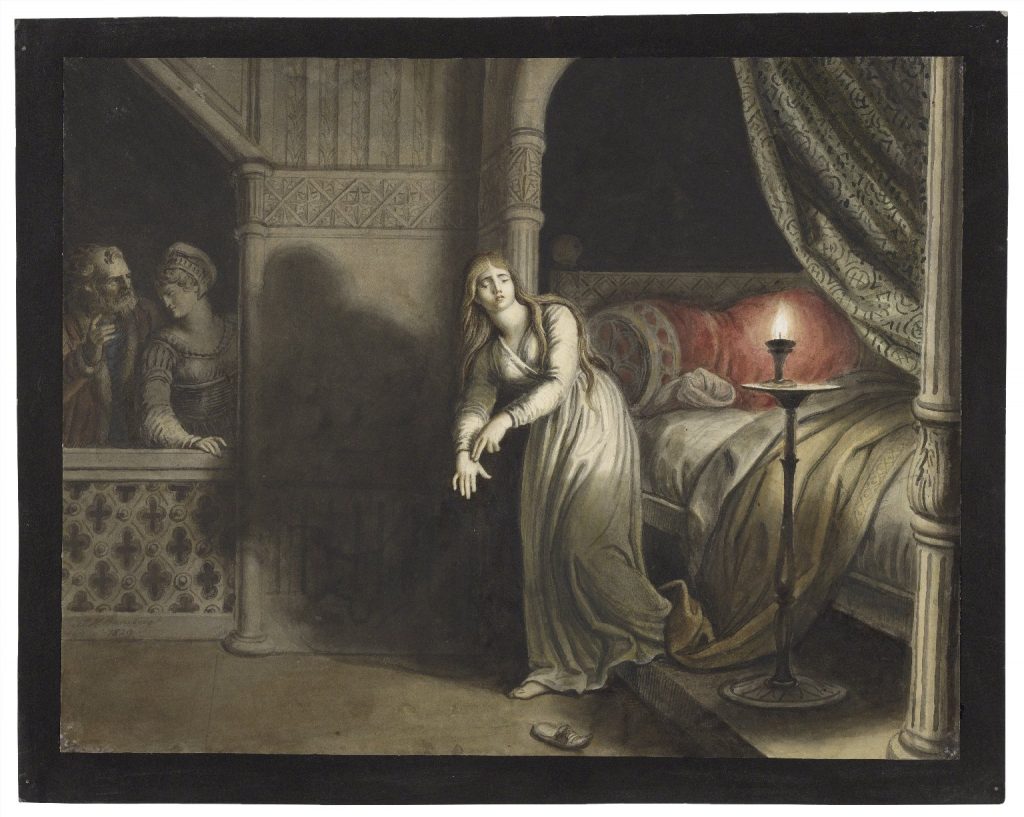

Despite his warning, the audience is informed in Act 5, Scene 5, that Lady Macbeth has managed to commit suicide off-stage.

He orders the Gentlewoman to remove from Lady Macbeth the "means of all annoyance", anticipating she might commit suicide. The Doctor feels Lady Macbeth is beyond his help, saying she has more need of "the divine than the physician". The Gentlewoman and the bewildered Doctor exeunt, realizing these are the symptoms of a guilt-ridden mind. With anguish, she recalls the deaths of King Duncan, Lady Macduff, and Banquo, then leaves. Lady Macbeth rubs her hands in a washing motion. The Gentlewoman replies she has ordered a light be beside her at all times (she is now afraid of the dark, having committed her crimes under its cover). The Doctor asks how Lady Macbeth came to have the light. The Doctor and the Gentlewoman stand aside to observe.

She will not report to the Doctor anything Lady Macbeth has spoken in her somnambulistic state, having no witness to confirm her testimony.Ĭarrying a taper (candlestick), Lady Macbeth enters sleepwalking. The Gentlewoman indicates Lady Macbeth has walked in her sleep. The sleepwalking scene opens with a conference between two characters making their first appearances, the Doctor of Physic and the Waiting-Gentlewoman. Well known phrases from the scene include "Out, damned spot!" and "All the perfumes of Arabia will not sweeten this little hand." The British tragedienne Sarah Siddons (1755–1831) was distinguished for her performance and interpretation of the scene. The scene is Lady Macbeth's last on-stage appearance, though her death is reported later in the act. The first scene in the tragedy's 5th act, the sleepwalking scene is written principally in prose, and follows the guilt-wracked, sleepwalking Lady Macbeth as she recollects horrific images and impressions from her past. The sleepwalking scene is a critically celebrated scene from William Shakespeare's tragedy Macbeth (1606). With that out of the way, let’s dive into the dark depths of Lady MacBeth.The Sleepwalking Lady Macbeth by Johann Heinrich Füssli, late 18th century. There is discussion of trauma, PTSD, and suicide in this episode, so if that will bother you, it may be best to skip this episode. We will examine the psychological symptoms displayed by Lady MacBeth and discuss how accurately they represent the trauma response.

Lisa Grogan and I will be discussing today. She seems to suffer the most from the trauma.Īnd that is what Dr. Lady MacBeth in particular loses all touch with reality and ultimately ends her own life. Murder and violence seems to haunt the Macbeths. From that murder, all others seem to flow. The key plot point is the murder of King Duncan committed by the MacBeths to secure their power. It is filled with ominous prophecy and - above all else - death. There can be no doubt that Macbeth is a tragedy. Sleep, the main course in life’s feast, and the most nourishing. Sleep that relieves the weary laborer and heals hurt minds. I thought I heard a voice cry, “Sleep no more! Macbeth is murdering sleep.” Innocent sleep.


 0 kommentar(er)
0 kommentar(er)
